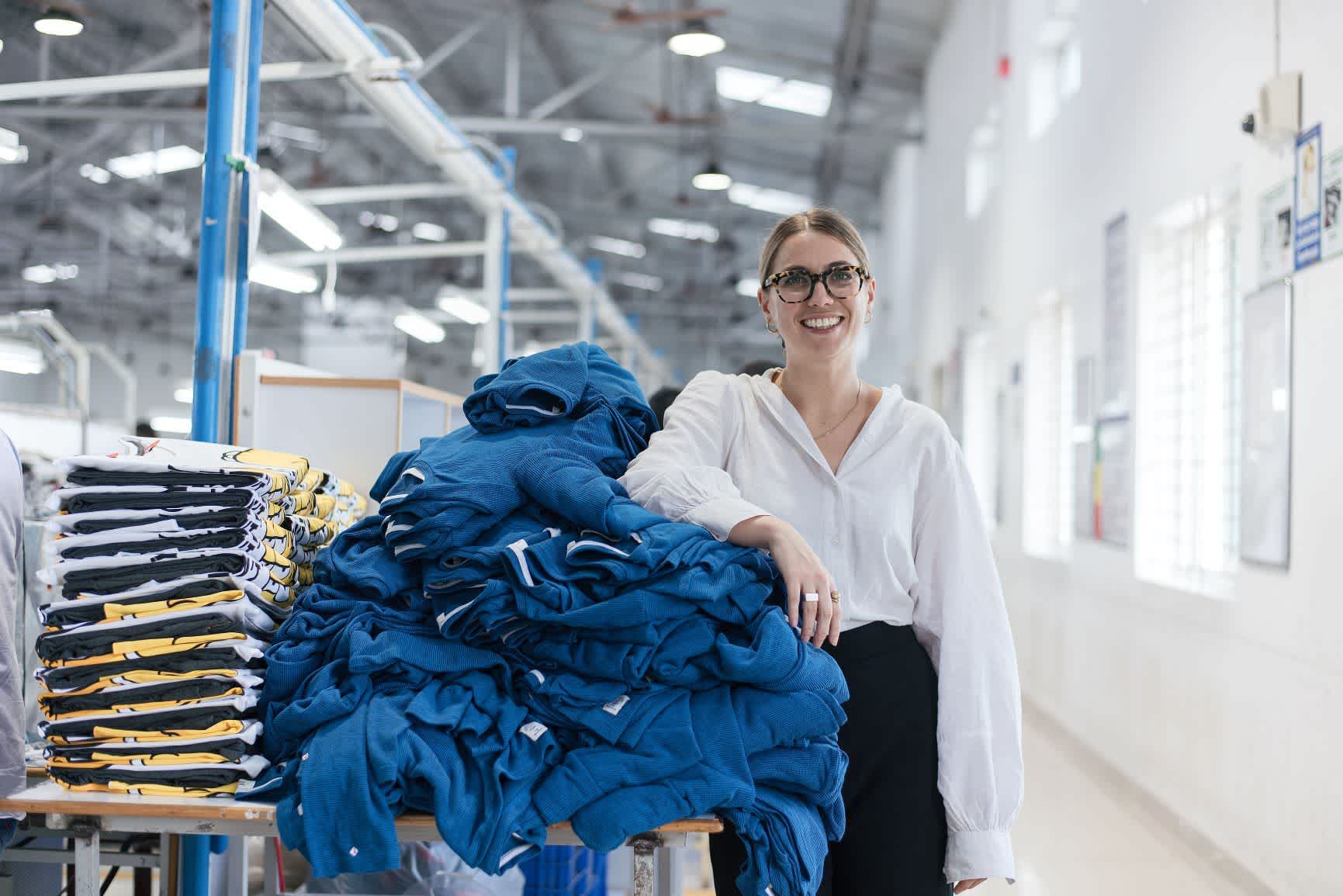
June 9, 2020
SupplyCompass: A Collaboration Focused on Fashion and Freight Forwarding
SupplyCompass: A Collaboration Focused on Fashion and Freight Forwarding
Recently we sat down with Flora Davidson, Co-Founder of SupplyCompass, to get a deeper understanding of the company and its differentiators.
Can you tell us about SupplyCompass and what makes you unique?
We set out to rethink how products are designed and produced for the digital age. With our platform, trusted supplier network, and experienced team, we empower brands and manufacturers to work better together by digitizing the entire product development process from design to delivery. This enables brands to build and manage global supply chains stress-free, and ensures brands receive high quality, sustainable products.
We are developing our end-to-end solution not just for brands, but for every player in the value chain. It is essentially a new digitized and standardized way of working for global fashion supply chains, that works for people, planet, and profit.
Beyond the obvious trends, what will be the next big thing in the fashion industry in 3-5 years?
Fashion supply chains, sourcing, and production processes haven't been subject to the same fast-moving trends as the consumer-facing side of the industry. The impact of COVID-19 really highlights the need for digital transformation within fashion—an industry that has been slower than others.
Fashion brands and manufacturers have been forced to change how they work, almost overnight, with whole workforces ‘WFH.’ Businesses are adapting and finding new ways of designing collections and ways to manage complex global supply chains, from their homes. If you can’t sit in a room all together to design next season, if you can’t go on design research trips, and if you can’t visit your factory’s showroom or receive samples through the post, what does the alternative look like?
I believe this global pandemic has the potential to be the catalyst for huge change and that this time under lockdown will free people from set ways of doing things, enabling new habits and approaches. It’s likely we will see a huge overhaul of the entire fashion system over the next 12 months, as every single business fights for survival and experiments with new solutions.
The big thing in 3-5 years will be circularity and closing the loop. For this to happen, a huge amount of time and investment is needed over the next few years to digitize global supply chains at every stage.
What competitive advantages can a fashion brand build into its supply chain?
- Go Digital: Move away from cumbersome systems such as MS Excel and email. Invest time and effort into adopting cloud-based software to make collaboration and communication—around product and collection development—seamless, and in real-time. This will save time, avoid costly mistakes, and enable fashion brands to run leaner operations.
- Invest in Building Great Supply Chain Relationships: This is the best strategic advantage a brand can have. Businesses that have transactional relationships with their supply chains are at a disadvantage. Understand that your factories are experts in their field and may have ideas you’d never have considered—move towards a mindset of collaborative innovation and explore ways to work better together.
- Transparency and Traceability: Know every partner, avoid value chains that span many continents, and look to produce close to the source of the raw material—it's cheaper, faster, and far more sustainable in the long run.
How can technology transform the fashion industry? What role does SupplyCompass play?
Technology is fundamental to the transformation of the industry. The entire infrastructure of supply chains required a digital overhaul prior to COVID-19. Without technology, sustainability is hard to implement, measure, and improve upon. At the same time, the robust, flexible business models that the industry needs, can only be serviced with innovation and digital supply networks, easy access to accurate data, and heightened workflow collaboration.
Our role as a company is to help fashion brands cut through the complexities of both the fashion supply chain and integration of technology, by providing a platform for all core functions to be easily digitized and managed. This will give them a strong base to further build more innovative systems.
You work with many designers, production managers, and fashion brand owners. What are the major supply chain challenges fashion brands are facing? How can SupplyCompass help?
We’ve observed two main challenges:
- Finding new factories: Many businesses are looking to either launch new product categories or are finding that their usual partners are closed. They are used to travelling to visit factories or trade shows, but this isn't feasible for the foreseeable future. It’s hard to find new, responsible and compliant factories fast, from your home, and it doesn’t always make sense for every brand and factory to fly around the world to find partners or business. This is why we built our digital supply network—we have spent years finding the best factories with the right certifications and connecting them with the right businesses to make a curated, vetted marketplace built on trust, accessible through technology.
- Processes: We’ve seen a 400% increase in inquiries of our platform over the past four weeks. For brands that haven't yet invested in product development or order management software, the process of designing, developing, and producing a collection is offline and fragmented. Designing collections, managing sampling and approvals, and giving fit feedback as a team is hard when communication is not streamlined. This is where our platform provides solutions, so that communication among teams and factories—from design to delivery of final products—is easily managed, accessible, and fully transparent.
What is one thing fashion brands should be adopting but are not yet?
We see businesses struggling to get the fundamentals right in terms of product development and production management. There’s no point talking about technology such as blockchain, AI, and on-demand manufacturing until there’s a solid digital core for basic functions. We speak to companies with more than 1,000 employees that still use Powerpoint, Excel, and WhatsApp to manage complex global supply chains, when these tools are simply not built for this.
In light of the COVID-19 pandemic, what advice do you give your customers?
Be open and flexible, honor your commitments, speak to your factories regularly, and experiment with new tools and systems. Use this time to add skills, streamline your processes, and build a robust sustainability plan.
What’s ahead for SupplyCompass?
Much of our focus will be on developing our product for manufacturers, mills, and others. Our aim is to get suppliers right at the start of the value chain working with the SupplyCompass platform. We will continue our digitizing of fashion supply chains so we can provide measurable and meaningful data on social and environmental impact.
What are the most important values to you as a business?
- Build great, personal relationships with every partner
- Be humble
- Never stop being open and curious
- Be adventurous and experimental
- Move at pace and lead the way
Historically fashion has been known as a polluting industry. In recent years sustainability has become more important for both brands and consumers. What are the main opportunities to reduce the impact of fashion?
We look at sustainability in three core areas:
- Design: A majority of fashion’s impact is in the way clothing is designed. It is imperative to understand the material you choose, exploring new material innovations, including recycled alternatives, while understanding the end-life of the product. But equally important is to consider the quality of the end product and to design for longevity—there is no real sustainable benefit if you prioritize quantity and excess production instead.
- Process: It is crucial to reduce inefficiencies, including waste within the supply chain and sampling and rejected goods; implementing low-impact, closed-loop processes; and switching to renewable energy—all while gathering data to back up sustainability initiatives.
- Supply Chain: Every business needs great partners right down to the source of raw material, while having full traceability and visibility across the entire supply chain. Having trusted partners who understand the complexities of the business, who have fully sustainable mindsets and know how to treat their workers fairly—and who are willing to be flexible, adaptable and tech-friendly—are invaluable to a fashion brand.
Tune in to our upcoming webinar to learn more about how businesses in the fashion industry can build momentum as they emerge from COVID-19.



